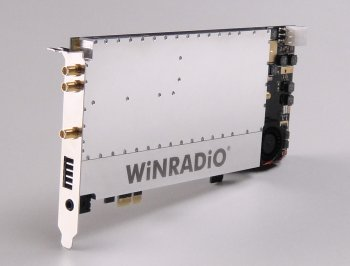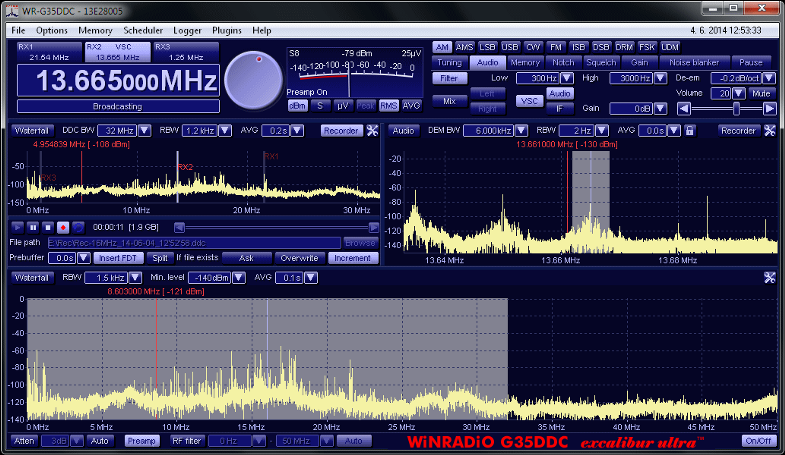The WiNRADiO WR-G35DDCi Excalibur Ultra is a high performance, direct-sampling, software-defined ultra-wideband shortwave receiver with a frequency range from 9 kHz to 45 MHz. It includes a real-time 45 MHz-wide spectrum analyzer and 32 MHz-wide instantaneous bandwidth available for recording, demodulation and further digital processing. The receiver's superior performance results from its innovative, direct-sampling, digital down-conversion architecture along with the use of leading-edge components and design concepts. These all result in a very high IP3, wide dynamic range, high sensitivity, and accurate tuning. These key features create a receiver in a class of its own, with wide application potential, with many operational and instrumentation features not usually found on receivers of any price category.
The entire 32 MHz DDC (digitally down-converted) bandwidth is available for recording and demodulation. Multiple demodulators allow the simultaneous reception and decoding of radio signals within the entire HF band. The receiver's robust front-end is equipped with an ultra-high-linearity amplifier which results in exceptional strong-signal performance while at the same time offering excellent sensitivity. The WR-G35DDCi Excalibur Ultra also features optional external reference clock inputs and outputs, as well as an FPGA interface, allowing for phase-coherent system configurations such as in high performance interferometer direction finding applications.

Features
- 9 kHz to 45 MHz continuous frequency range
- Direct sampling
- Digital down-conversion
- 16-bit 100 MSPS A/D converter
- 45 MHz-wide, real-time spectrum analyzer
- 32 MHz recording and processing bandwidth
- Ready for phase-coherent system configurations
- Continuously adjustable filter bandwidth down to 1 Hz
- Three parallel demodulator channels
- Waterfall display functions
- Audio spectrum analyzer
- Audio and IF recording and playback
- Recording with pre-buffering
- Very high IP3 (+31 dBm)
- Excellent sensitivity (0.20 µV SSB, 0.10 µV CW)
- Excellent dynamic range (107 dB)
- Excellent frequency stability (0.5 ppm)
- User-configurable preselection filters
- Selectable low-noise preamplifier
- Test and measurement functions
- PCI-e interface
The receiver interfaces to a Windows-compatible PC via the PCI-e bus. Several receivers can reside on a single PC to form a multi-channel receiver system. The receiver is very well shielded against interference, making it possible to operate in a noisy computer environment. Its very modest power requirements of less than 10 watts allow it to be powered from the PC's internal power supply. There is also provision for an external power supply feed in cases where several of these receiver cards are to be installed in a multi-channel configuration. This is the first time a receiver of such advanced specification and unique combination of features is being offered to the general marketplace. The receiver is intended for government, military, security, surveillance, broadcast monitoring, industrial and demanding consumer applications. Easily installed to any modern computer with the PCI-e bus interface, this receiver represents an excellent multi-purpose mobile and stationary solution for advanced HF monitoring and surveillance.

The WR-G35DDCi control software provides a highly functional and logical user interface. There are several spectrum analyzer configurations available, including the 45 MHz full span with 1.5 kHz resolution.
The scaleable spectrum display can be viewed in either the standard or waterfall mode. The digital down-converter provides 33 selectable output bandwidths ranging from 20 kHz to 32 MHz. The receiver's selectivity can be adjusted with 1 Hz resolution. Recording and playback are also provided at the output of the digital down-converter, whereby a 32 MHz wide spectrum chunk, representing the entire HF band, can be recorded for later demodulation and post-processing.
In spite of the receiver's ground-breaking architecture and powerful functionality, the user interface still remains simple and intuitive to use, with a rich on-line help facility. The control software contains all the features generally expected in modern receivers such as noise blanking, memories, scheduler, squelch (level, voice or noise activated), numerous tuning options, and a wide choice of demodulation modes, including user-defined and optional DRM modes.
The parameters of all three independent demodulator channels can be set separately, allowing each to be recorded simultaneously and independently. Recording and playback are also provided at the output of the digital down-converter, where an entire 32 MHz spectrum band can be recorded for later demodulation. Pre-buffering prevents signal loss at the start of a transmission. A flexible scheduler function allows unattended recording of each channel at specified dates and times.
There is also a unique "pause" function, making it possible to pause reception and resume it when convenient. This is very useful in case the receiver is left unattended for a period of time.
A "toolbox" full of various test and measurment tools, such as frequency error, SINAD, THD and modulation meters, logger and scheduler, complement the entire package and make it possible to use this product as a measuring receiver, replacing much more expensive (and often less capable or accurate) conventional test equipment. The software-defined architecture allows easy software upgrades for demodulation and decoding requirements. Component variations and aging are greatly diminished in a software-defined receiver, assuring long-term premium performance.
| Receiver type | Direct-sampling, digitally down-converting software-defined receiver | |||||||||||||||||||||||||||
| Frequency range | 9 kHz to 45 MHz | |||||||||||||||||||||||||||
| Tuning resolution | 1 Hz | |||||||||||||||||||||||||||
| Mode | AM, AMS, LSB, USB, DSB, ISB, CW, FMN, FSK, UDM (user-defined mode) DRM mode optional |
|||||||||||||||||||||||||||
| Image Rejection | 95 dB typ. | |||||||||||||||||||||||||||
| IP3 | +31 dBm (preamp off) +21 dBm (preamp on) |
|||||||||||||||||||||||||||
| Attenuator | 0 - 21 dB, adjustable in 3 dB steps | |||||||||||||||||||||||||||
| SFDR | 107 dB min. (preamp off) 103 dB min. (preamp on) |
|||||||||||||||||||||||||||
| Noise figure | 14 dB (preamp off) 10 dB (preamp on) |
|||||||||||||||||||||||||||
| MDS | -130 dBm @ 10 MHz, 500 Hz BW (preamp off) -134 dBm @ 10 MHz, 500 Hz BW (preamp on) |
|||||||||||||||||||||||||||
| Phase noise | -145 dBc/Hz @ 10 kHz | |||||||||||||||||||||||||||
| RSSI accuracy | 2 dB typ. | |||||||||||||||||||||||||||
| RSSI sensitivity | -140 dBm | |||||||||||||||||||||||||||
| Processing and recording bandwidth (DDC bandwidth) |
20 kHz - 32 MHz (selectable in 33 steps) |
|||||||||||||||||||||||||||
| Demodulation bandwidth (selectivity) |
1 Hz - 64 kHz (continuously variable in 1 Hz steps) |
|||||||||||||||||||||||||||
| Spectrum analyzers | Input spectrum/waterfall, 30 or 45 MHz wide, 1.5 kHz resolution bandwidth DDC spectrum/waterfall, max 32 MHz wide, 1 Hz resolution bandwidth Channel spectrum, max 64 kHz wide, 1 Hz resolution bandwidth Demodulated audio, 24 kHz wide, 1 Hz resolution bandwidth |
|||||||||||||||||||||||||||
| ADC | 16 bit, 100 MSPS | |||||||||||||||||||||||||||
| Sensitivity (@ 10 MHz, with preamplifier) |
|
|||||||||||||||||||||||||||
| Tuning accuracy | 0.5 ppm @ 25 °C | |||||||||||||||||||||||||||
| Tuning stability | 0.5 ppm (0 to 50 °C) | |||||||||||||||||||||||||||
| MW filter | Cut-off frequency 1.8 MHz @ -3 dB Attenuation 60 dB min @ 0.5 MHz | |||||||||||||||||||||||||||
| Preselection filters | 4 high-pass and 4 low-pass filters available in automatic, manual or bypass mode, plus various band-pass filters (combinations of low-pass and high-pass) | |||||||||||||||||||||||||||
| Antenna input | 50 ohm (SMA connector) | |||||||||||||||||||||||||||
| Output | 24-bit digitized I&Q signal over USB interface | |||||||||||||||||||||||||||
| Interface | PCI Express | |||||||||||||||||||||||||||
| Power supply | 10 W max | |||||||||||||||||||||||||||
| Operating temperature | 0 to 50 °C |
Specifications are subject to change without notice due to continuous product development and improvement.
| download brochure WR-G35DDC |